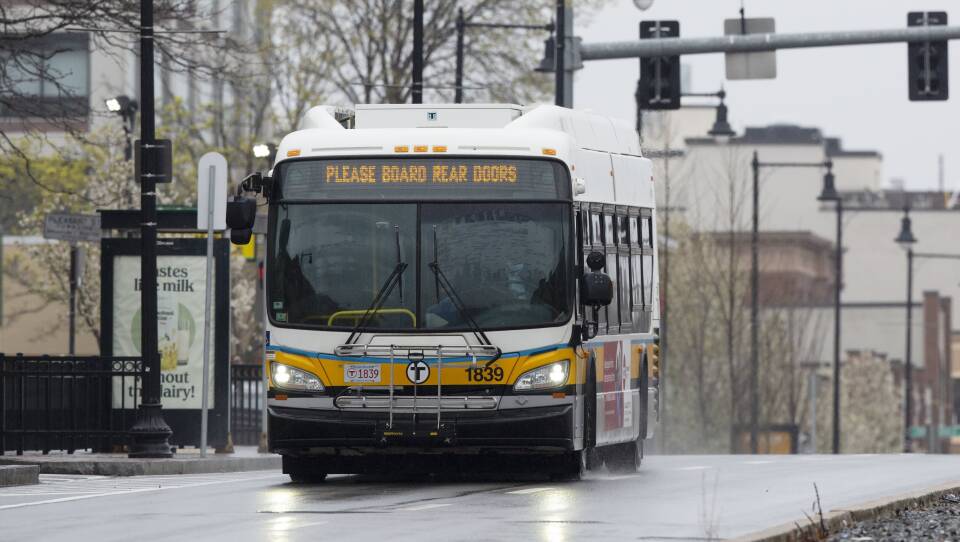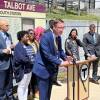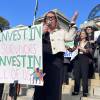The MBTA is "not making the sort of progress we really want to see" in its efforts to recruit new bus operators, a top official said Thursday, describing ongoing challenges in one of several areas where staffing shortages have bled into service disruptions.
About three dozen new bus drivers started in October as part of the first class in a new MBTA pilot program that allows applicants to receive commercial driver's license training during the onboarding process, rather than before they get hired. Another 63 candidates are ready to hire for the second class in that pilot program, according to figures presented at a T subcommittee meeting.
But when pressed by board members on how many bus operator positions remain unfilled, MBTA Chief Human Resources Officer Tom Waye could not provide specifics and said he would need to circle back with an estimate.
"We're making progress," Waye said. "There are some significant numbers still to fulfill in that area."
MBTA Chief Administrative Officer David Panagore jumped into the discussion, saying the agency is "making progress from the point of view of filling our class sizes" and "holding steady" in the face of retirements and other departures.
"But we're not making the sort of progress we really want to see," Panagore said. "We're doing well, better, on the hiring on the class side, and we've definitely seen some drop-off after the end of the year in terms of some of the retirements. But again, it is a very hard and tall slog and it's going to continue for many months."
Like other transit agencies and many employers more broadly, the MBTA has struggled to attract and retain workers amid a tight hiring market.
T higher-ups have responded by slashing service on both rail and bus routes. In October, officials said the MBTA needs to hire more than 300 drivers to "get back to where we're budgeted to be," plus add about 440 more to achieve the net 25 percent increase in service hours envisioned in a multi-year redesign of the network.
The T workforce has drawn scrutiny, and federal investigators concluded in August that the MBTA might need as many as 2,000 more workers to safely run trains, buses and ferries at existing service levels.
Earlier in the summer, the Federal Transit Administration found the T had only 14 heavy rail dispatchers employed in the operations control center despite officials requesting 20 people in those roles. The lack of workers prompted the MBTA to require dispatchers to work lengthy shifts with little rest, and after the FTA said that practice posed major safety risks, the T slashed weekday service on the Red, Orange and Blue Lines in cuts that have not yet been reversed more than six months later.
Waye said Thursday that the operations control center had 27 active dispatchers as of Jan. 10, the same number that Panagore mentioned in a December update.
The T is now hiring candidates directly into full-time dispatcher roles rather than bringing them on board as spare dispatchers, Waye said.
Only internal candidates who meet a specific set of eligibility requirements can apply given "the nature of the role and the safety implications," according to Waye. Recruitment efforts are ongoing, with two tours of the control center planned in the next few weeks, open houses taking place in stations and a $10,000 sign-on bonus extended until March 31.
Waye's presentation indicated the T is "targeting one additional full-time dispatchers [sic] and five spare dispatchers," but officials generally have not said when they expect to restore core subway service levels following the June cuts.
Gov. Maura Healey said in her inaugural address on Jan. 5 that she plans to fund the hiring of 1,000 new MBTA workers to focus on operations during her first year in office, but Thursday's update suggests that actually bringing those new employees on board will be a challenge.
Top lawmakers have said they want to see improvements in hiring at the T, but have offered few specific suggestions. In a 78-page report wrapping up its oversight investigation into upheaval at the transit authority, the Transportation Committee said "it may be that T management and the unions need to rethink their approach to attracting today's workforce."







